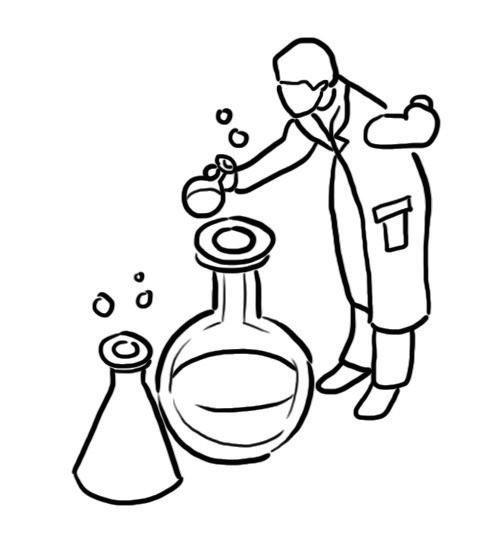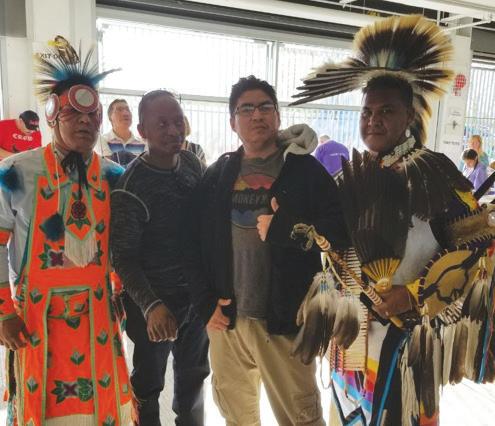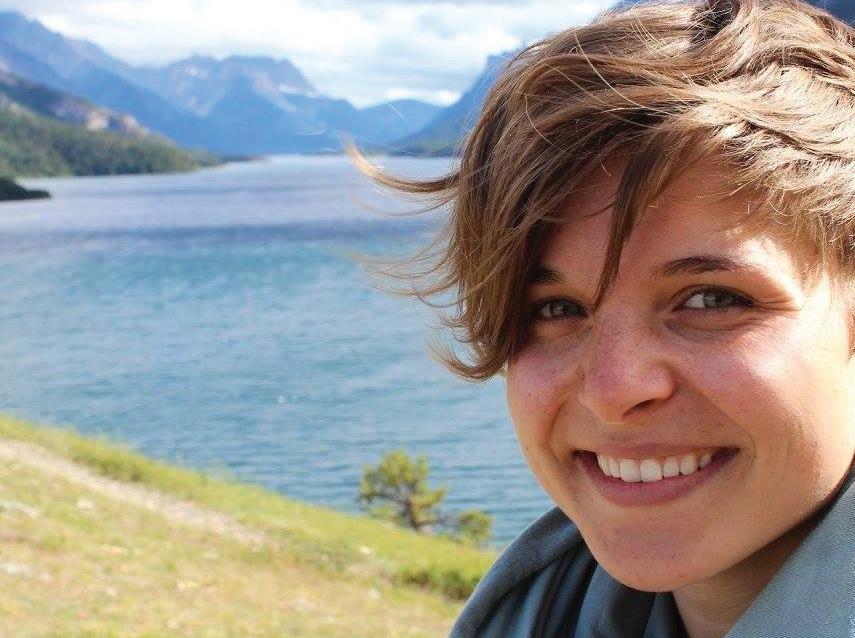
19 minute read
Executive Director’s Report
Executive Director Report
February 2019 marked the beginning of a new chapter for Skills Society and for myself as the incoming Executive Director. I’m new to the role, but not new to leadership in the sector nor this great organization. Coming into the role of Executive Director I’m excited and honoured to continue to steward, lead, and bring out the best of one of the most respected and innovative disability service organizations in Alberta. I’m really grateful having been passed the torch from the previous Executive Director Pat Conrad who mentored me and passed along much wisdom and experience that I want to make sure to keep alive. I could imagine some might want me to cut to the chase and share what my focus will be at Skills now that I’m the new Executive Director, however I’ve also heard some people may not be familiar with my background and would like to know a bit about me, my values and what experiences I bring. So, even though it makes me cringe a bit to focus on myself, before I get to our emerging focus at Skills, I’ll share a bit so you can get a sense of my leadership style. Bear with.
Bit of my story
Over twenty years ago I got into disability rights and services. I was seventeen, idealistic, a bit of an artist and influenced by my step brother who has a significant developmental disability. I wanted to make a difference in the world and saw that people with disabilities still hadn’t truly had their liberation moment yet. I was gripped by that urgent sense that many in our organization feel, that there is much to be done to help people with disabilities be recognized, respected, valued and authentically included in community life. Around this time, I met a family who needed support for their son who has a significant developmental disability. Somehow this family took a chance on a misfit kid and allowed me to learn how to support their son. To this day I still have a strong connection with this family and I’m grateful they let me in, taught me and allowed me to be part of their story as they are part of mine. From this formative experience, I went on to a variety of front line roles in disability services, went to MacEwan University in Disability Studies, worked front line in the inner city and was fortunate to land at Skills Society fifteen years ago. Since that time, I’ve worn a few hats, such as being a coordinator, working in outreach, being senior leader of research and social innovation, and helping steward many of our social change initiatives from the last ten years. I feel fortunate that through mentors, continuous learning, and a culture of creativity and healthy risk tolerance for trying new things, I’ve been part of the story of shaping what Skills Society is today. A key thing that is not lost on me and that I won’t forget, is that I’m standing on the shoulders of leadership giants who have come before and many who are still at Skills leading positive change in order to improve the lives of people with disabilities.
Grounded in our 5 core values, I strive to put the following leadership principles into daily practice
Person-centered support
There is not a one size fits all solution to supporting people. This is a deep practice at skills where we need to keep assumptions in check and deeply listen and respond to what folks we serve truly need to live their full potential.
Seek win win solutions that keep people most safe and are least intrusive
We are responsible to do our best to ensure the safety and wellbeing of people we serve and our employees. We also need to work at ensuring we don’t unintentionally create unnecessary intrusions into the lives of people we support.
Be careful not to make knee jerk reactions and decisions
Need to look at the big picture and strive to consider ramifications and unintended consequences of hastily made decisions.
Take the work seriously, but strive to not take myself too seriously.
Sense of humour, and fun helps with relationships and evidence shows makes people better problem solvers in complex situations.
Don’t avoid conflict and don’t create unnecessary conflict. You will find me seeking clarity, asking for viewpoints and seeking to find win wins as best we can.
Being the son of a psychologist, I could never get away with avoiding conflict. Conflict will eventually happen when humans do stuff together. Not all conflict is bad. However unresolved conflict harms culture, relationships and our ability to do great work.
My default mode is collaboration, seeking input and ideas. I will strive for clarity on who makes decisions and in which situations.
We all have important contributions and perspectives. Seeking deep input, and ideas makes for better solutions. People are also more supportive of change initiatives when they feel they have been part of shaping the change effort.
I will often say things like, “Ok, what’s the core problem we’re trying to solve here?”
I do this for clarity and to help with aligning people to find pathways forward.
Progress over perfection
Growth, learning, and openness helps us lead with a bit more humility and embrace complexity better than thinking we have to be perfect.
Prototype first before big roll outs
Little tests of ideas helps to keep assumptions in check and see if something will work the way we
think it will.
How, why and what exactly moves onward in a long established successful organization?
This key question is at the root of the theme for our annual report this year. As the new executive director in a long established organization, I’m asking, do we just keep doing the same things we’ve always done? Should we focus more on fresh new things? How should we pay attention to the emergent unexpected opportunities we can’t plan for? The answers to what can successfully keep us moving forward for the folks we serve is getting the right mix of the old, the new and a dash of surprise. The theme is a riff on a quote from our friend and long time disability advocate and social innovator Al Etmanski.
Al Etmanski
What does this theme really mean for Skills Society?
It means that in moving forward into our next chapter we can’t be focused all on the new and we can’t get stuck in past ways of how things used to be we need to focus on getting the mix right at the middle. The theme means we need to carry our learning and history forward, while at the same time be open to fresh possibilities and new learning. History is easily lost and being aware of it is one of the reasons we’ve included a timeline of key
historical learning moments in this annual report.
Al Etmanski visited our Skills office in May and let us take a pic of him next to his famous quote we have on our wall
Why not just start fresh with a new direction and forget the past?
In the short term it may seem easier to begin a new chapter of Skills fresh, but in the long term it will result in repeating mistakes by not harnessing the deep learning that could propel us forward in better ways for people we serve. In addition it’s important to be aware of a common myth that for forward progress and innovation you just have to look to the new trends and harness them. This myth was busted for me when during my graduate studies I studied what fosters better problem solving in human service organizations. One thing that struck me from the literature on creative problem solving was that impactful innovators, and creative organizations exhibit a common pattern. The pattern is that they go deep to understand a domain of interest from many angles, and then open up to new perspectives that they can remix into solutions and pathways forward. In other words, healthy organizations that navigate well tend to embrace the complexity of paying attention to both the old and the new. When the old and new mix together well, helpful insights emerge that can generate relevant solutions and pathways.
SKILLS SOCIETY CORE VALUE
Building and Sharing Knowledge
In May of this year, Chris, Jan, and Erin, longtime MyCompass stewards, presented on our MyCompass Lab process at the ACDS conference. We love sharing our work publicly at conferences as it sparks commentary and critique and creates opportunities for new partnerships to emerge.
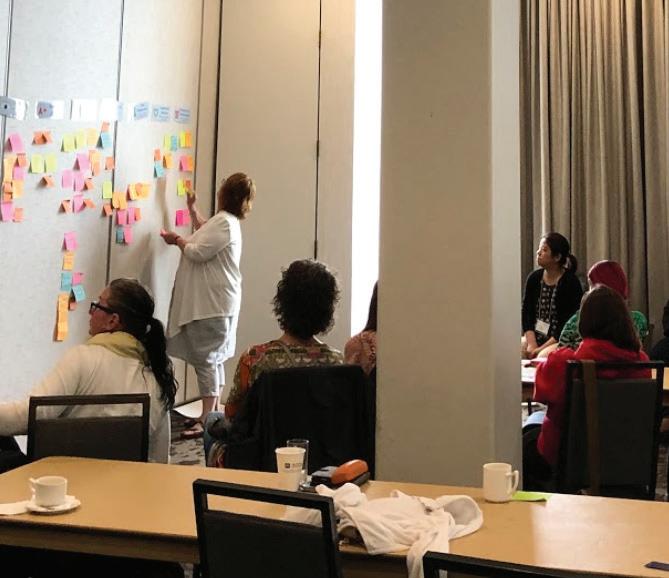
Jan, MyCompass Steward, presenting at the ACDS conference on our MyCompass Planning Lab process.
ONWARD!
Mixing in Learning from the “Old”
The “old” in relation to our theme should be associated with wisdom, historical learning and experience. Skills Society started forty years ago from a grassroots movement of parents of adults with developmental disabilities. Families stood up, and went against the status quo of the time. These grassroots change makers said their kids deserved the same opportunities as any other citizen and should be welcomed and part of community. This was radical, brave and very innovative at the time to go against the established system that basically had convinced families and society that people with disabilities were not fit to be part of community and better off inside congregate care institutions where thousands of people were kept. From the stories and histories of institutional life from people who lived it in North America, life inside institutions was bleak, dehumanizing, and with many violations of basic human rights occurring regularly. For example it wasn’t too long ago that eugenics and forced sterilization of people was disabilities was practiced in Alberta. In the 1930s the Nazis used our Alberta based “cutting edge” eugenics programs to inform how to go about exterminating people with disabilities. Forced sterilization ended in Alberta in the 1970s. As horrible and sad as this history is, it is so important to never forget.
The ‘Old’: The roots we need to sustain
It’s important never to forget because those that unintentionally upheld systems of oppression would have seen themselves as good people doing what they thought was best for the “greater good” or for the health of the economy or for the health of society. We need to be aware that it isn’t as difficult as we might think to fall back into dehumanizing people and harming the most vulnerable in society with many good intentions along the way.
For forty years, Skills has been on the cutting edge of pioneering ways to support deep belonging and full citizenship of people with disabilities. To always get better we have listened to people, history, and trends. We’ve tried things, learned, adapted and continuously improved and responded to emergent feedback and opportunities. This pattern from our roots of being a learning organization we will continue to bring forward so that ultimately our supports continue to be relevant, safe and empowering for the folks we serve and for community. To pay attention to our roots and knowledge, I’ve been engaged in interviewing leaders at Skills and community about what we shouldn’t forget. We’ll also be doing focus group explorations with folks we serve in the near future.
What follows are a few themes from what I’ve heard Skills leaders say we can’t forget or lose as we move forward into the future. Ensure Supports are Person Centered
Putting people into one size fits all models of support dehumanizes the unique experience and gifts of people. People served need to be part of shaping what support they need.
Healthy Relationships are Key
Healthy relationships with people served, between supports and people served, between families and the organization, between employees, between funders and Skills, between the community and Skills is essential to moving onward in a good way. Healthy relationship building is a responsibility of everyone.
Grassroots Mobilization
Big progress historically for people with disabilities has come from collective effort, coalitions and grassroot movement building.
Work Collaboratively and Creatively
Skills has known for years that in complexity, one individual can’t solve a tough social challenge like improving social inclusion outcomes of people with disabilities. It takes diverse people and policy makers from across a system to work collaboratively.
Mixing in Learning from the “New”
A common pattern of progress and moving onward is after going deep into learning about a domain of interest, systems change leaders should take a bit of time to shake up siloed thinking habits by looking for fresh perspectives in new domains. For example, we’ve created some pretty stellar services and social innovations like Project Citizenship, CommuniTEA Infusion Project & MyCompass Planning because we mixed new concepts from other fields. We’ve successfully learned from new ideas like design thinking and nudge science and then mixed them with traditional person centered planning. Looking outside familiar silos is counter cultural and to those that are siloed in their thinking, it can often be mislabeled as mission drift or losing roots. Our core value to Seek Creative Collaborations is so we are open to new perspectives different from what we’re used to and to make good things happen by the coming together of diverse perspectives. It’s a tricky balance to keep grounded in one’s domain purpose and to explore the new to mix in. But, it’s what keeps us moving forward positively. Regardless of how we explore “new” ideas and perspectives, they always need to come back around to the core challenge being tackled. At Skills Society’s core is to ensure our supports help people we serve to carve their own paths towards more dignity, respect, health, belonging and being valued as important citizens in society.
Thomas Edison
The ‘New’: Trends and ideas to learn from at present
Humanizing and Harnessing Data
Data is stories and numbers and how we make sense of the data to inform decisions and be responsive to needs.
There is a reason our sector has an aversion to data. “Data” historically was used to oppress people with disabilities. It was used to label and number people. Data too often limited potential and reinforced negative stereotypes. It can too often oversimplify complexity. We are in a new era and we need to get better at harnessing and humanizing data. We need to get better at showing impact and learning and responding well to new data - both stories and numbers.
Future of Home and Belonging in Community
What home is, is changing for the current generation. Many young people are choosing not to buy houses, seeking tiny home living, co-op housing and other forms of shared home living. We need to look at new possibilities for creating home life for people we serve and new people we are going to serve that is in keeping with our times and helps people be less isolated and lonely.
Nudge Science
Getting people’s minds and actions to change to be more inclusive and supportive of people with disabilities is hard. Traditionally we’ve used education, arguments for rights and stories to elicit empathy in order to positively shift policy and behaviours of community and supports. Having an empathy experience doesn’t necessarily mean people will change. It takes multiple creative nudges over time, reflections, and engaging in learning by doing in order to nudge lasting positive change. There is lots of interesting research on this topic we are using with MyCompass Planning and with our social innovation labs.
Culture of Innovation
All services, systems, and programs have a shelf life or need to adapt over time. A culture of innovation creates the basis for ensuring services and systems are relevant and responsive to needs. We need to keep learning about and stewarding a culture of creativity and innovation to help good ideas to emerge from anywhere in our organization - from people served, families, employees or allies.
That Dash of Surprise!
Supporting the good kind of surprises to emerge
Not everyone likes surprises and there’s a good reason for it - aversion to surprises comes naturally to our brains. As humans we tend to crave certainty. Our brains are wired from thousands of years of our ancestors trying to control uncertainty and avoiding being surprised by a predator. The more uncertain and chaotic our world gets with rapid changes, it is understandable we want to be prepared, avoid surprises and don’t want to be bowled over. Negative surprises we can somewhat prepare for through scenario planning, creating decision trees and guiding principles to navigate when surprises emerge. We do lots of this at Skills together with folks we serve, employees and the board and will continue to in order to help mitigate risks and be ready for challenging surprises as best we can.
We also need to be ready for the good kind of surprises. Those are the eureka moments, the aha moments, the unexpected insights that often emerge when mixing old ideas with new ideas. These moments can happen lots of ways like when two diverse people and perspectives come together to constructively share ideas and experience. We can’t know exactly when the good surprise insights will come, but we can lay a foundation for them to come more often.
Go deep to learn from our field’s history and roots.
Then look for inspiration, trends and new ideas from other fields. Explore how you might connect them in relevant ways to people we serve. Because it’s part of how healthy organizations move forward responsively and adaptively into the future.
Seek out perspectives different from your own.
Where all think alike, innovation and progress will be stifled. Those good insight surprises can come from positive creative collisions with different perspectives.
Don’t wait for inspiration. Seek it out and be determined to keep being inspired by the little and big things.
Looking at some of the stories of folks we serve in the annual report is inspiring and can spark many ahas and surprises about what’s important in supporting people. Keep seeing and looking for the gifts, strengths and great qualities in people we serve, in our great support workers, leaders and allies in community.
So What? Now What...
Pathways to Explore
I’m four months into the new role. I know Skills Society is an organization with deep knowledge and experience throughout all levels. I’ve completed interviews with leaders and now want us to learn a bit more from folks we serve. To do this we’ll be hosting some conversations in our Action Lab and maybe in community to explore and listen over the summer and fall. In conversations with Skills leaders so far, the most common thing shared with me is that Skills Society embarked on big transformation a number of years ago with our values refresh, growth, new models of support in outreach and social innovation initiatives. There is a sense that we don’t need a major transformation, but more so to protect and sustain the good things we all worked hard to create while at the same time keep responding to the emerging needs and opportunities that arise.
Strengthening Collective Links between Employees Based in the Office & Community
We are a large organization and we crave the family feel of a smaller organization.
Deepen and Expand Ways of Supporting Belonging at Home and in Community
People with disabilities are some of the most isolated folks in community. Evidence suggests that people are safer and abuse is reduced when people have meaningful relationships and connections. Our supports open up pathways for connections, caring and belonging. This is deeply complex work and we can always get better.
Strengthen Culture and Practices That Help Us Embrace and Navigate Complexity Well
We need to build our capacity to continue to support people with complex needs. We need to continue to respond/adapt to meet individual needs and challenges that might emerge in our sector.
Get Better at Data - Stories and Numbers
Our sector needs a whole lot of research and development (R&D) around harnessing and humanizing data. We need to get better at showing our impact using data and harness data to be responsive to needs. We are well positioned to explore this with MyCompass Planning.
Continue to Support All the Good Stuff we’ve Built over 40 Years
We have so many amazing things already going on at Skills that we need to continue and sustain. We will continue to sustain, adapt and evolve.
SKILLS SOCIETY CORE VALUE
Safeguarding Healthy Relationships
One way we connect with others and build deeper relationships is by inviting them to share important moments with us. This year, Chris wanted to celebrate his 30th birthday in a big way, doing something he had never done before - hosting a birthday bash at West Edmonton Mall and spending a night at a hotel! With the help of his supports, Chris planned his dream party. He was so excited to celebrate and share this milestone with all his favorite people!
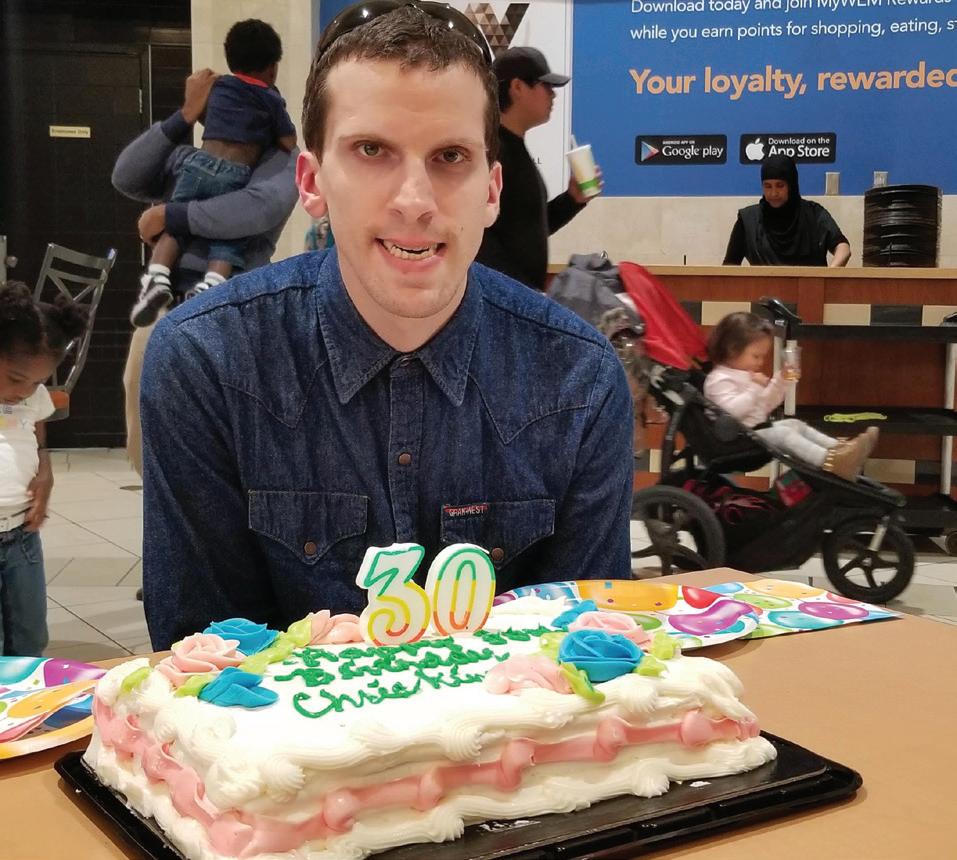
Onward Together!
Leadership can and should be at all levels in an organization. Whether from folks we serve and families, front line, management or on the board - we need leaders throughout willing to help remove barriers, and willing to lead in opening up new possibilities for people to live good lives. Whether people we serve have opportunities for the good life, very often it is determined by the passion, determination and leadership of ordinary folks trying to make a positive difference. I’m sending you all some virtual high fives and deeply grateful for the creative work our Skills Society collective does every day to open up possibilities for the stellar citizens we serve. Onward together!
Ben Weinlick, Executive Director
Chris smiling proudly with his 30th birthday cake at his big birthday bash he planned.
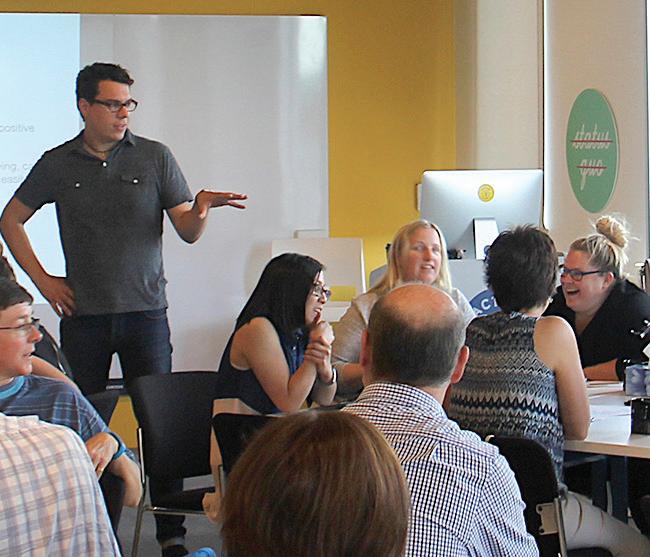
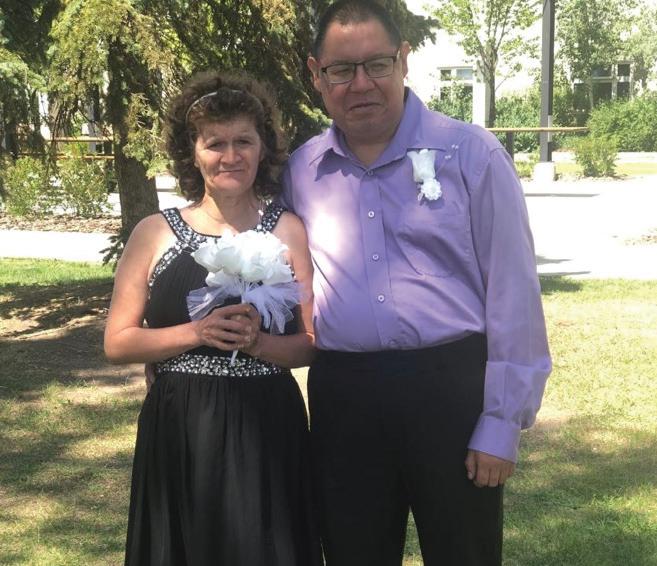
Lenny and Tina renewed their vows this year and hosted a gathering at Melcor to celebrate their anniversary with friends and family.
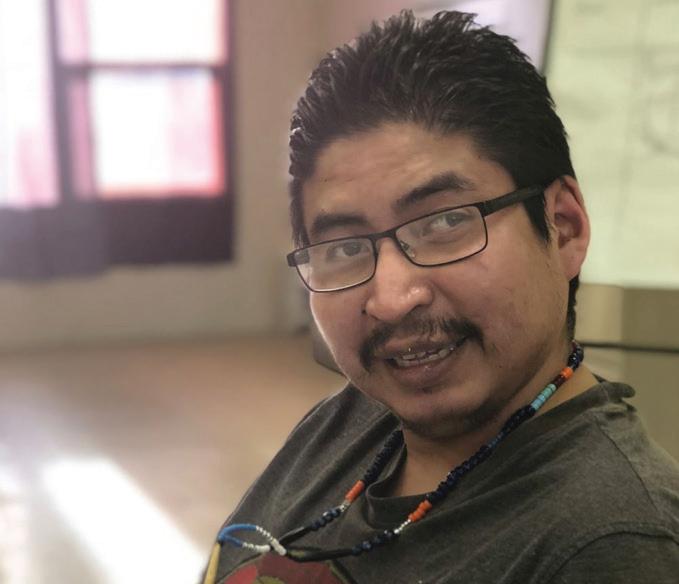
Vincent enjoying himself at a local pow wow.
